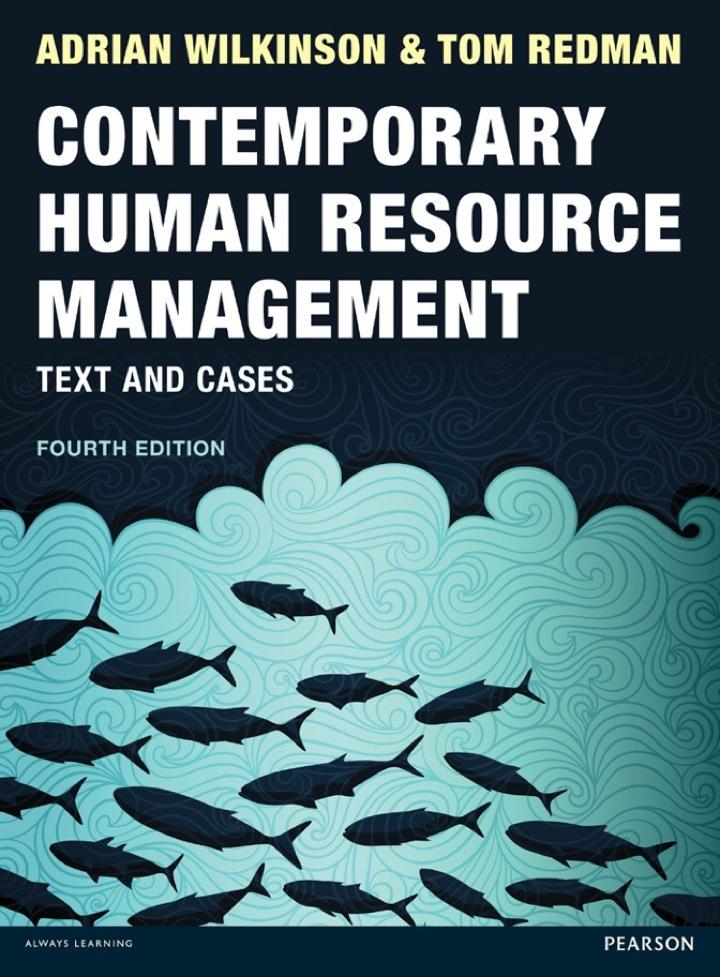This case study examines the way management and HRM practices are used to support the work and
Question:
This case study examines the way management and HRM practices are used to support the work and knowledge activities in an organization whose workers are geographically dispersed and isolated, with few opportunities to interact and meet on a face-to-face basis.
ORGANISATIONAL CONTEXT
Domestic-Powerco is a UK-wide company whose main business is installing, repairing and servicing heating equipment in the homes of private individuals. During the 1990s, Domestic-Powerco management implemented a large-scale cost-cutting and restructuring programme, as such changes were believed necessary to allow the company to remain commercially competitive.
The research this case study is based on was carried out during the first half of 2003, with two colleagues of the author from Sheffield’s Institute of Work Psychology.
The research looked into the characteristics, knowledge sharing and communication dynamics of work that could be described as mobile telework, where people make extensive use of information and communication technologies as a central part of their work, and whose work requires geographic mobility between sites. The research study was small scale, and exploratory in nature, and in Domestic-Powerco involved extended, semi-structured interviews with six people who worked in the service, repair and installation division, in Lincolnshire and South Yorkshire.
Before the restructuring process it would have been inappropriate to describe the service engineers as mobile teleworkers, as while their work required them to be geographically mobile, the engineers were not required to use ICT’s, and they all operated out of central depots, from which they started and finished their daily activities. During this period, while the engineers were required to work in customers’ houses on their own, the fact that they began and finished work each day from a central depot, and had to return to the depot if they needed particular spare parts, meant that there were extensive opportunities to interact with, and share knowledge between engineers. This can be illustrated by the following quote, from one of the engineers interviewed, I can remember just before the depot shut, we had some outside assessors come in to look at our training, and …the best training they saw was the informal training, with everyone stood around the locker, you know, and someone’s got a part in their hand, and it’s ‘oh, don’t take the right side off, do it from the left, it’s a lot easier.
THE TRANSFORMATION OF SERVICE ENGINEERS INTO MOBILE TELEWORKERS
The changes involved in the restructuring project were extremely radical in nature, and involved reducing the workforce from approximately 10,000 to 4,000. Further, there was also a programme to close an enormous number of the 450 depots that existed in the UK at that time, with offices and depots being rationalized into regional centers. As part of this process, the service engineers lost their bases in local depots. These workers no longer had any physical location at which they were based. While historically they had gone to the depot to be allocated jobs, under the new system this process was no longer necessary. Instead, each engineer, who had their own van and set of equipment, laptop and mobile phone, received their work instructions electronically.
Thus, in terms of knowledge sharing, this change in working practices significantly reduced the opportunities for the type of interaction and knowledge sharing among peers illustrated by the first quote. This was summed up as follows by one of the engineers interviewed, [Isolation] can be an issue. I think the one thing we have lost is the word-of-mouth to engineers, the group gathering in the morning. It is like taking a part of the social life off you. . . . A lot of the engineers would say the main thing they have lost is the contact with other engineers [about] this job.
As will be seen in the following section, Domestic-
Powerco have recognized the consequences of these changes and have dealt with the loss of this informal means of knowledge sharing relatively successfully, through a number of mechanisms. However, among the engineers interviewed it was apparent that the organizational means to support interaction, communication and knowledge sharing did not totally satisfy their needs, and many of them developed their own informal means of doing this out of working hours, as illustrated in the following quotation, We all go . . . to pick up our parts, and there’s a canteen there and there’s often four or five of us in the morning, so we’ll go up and have a cup of tea and a chat, so we’ve gone together – we still do meet each other, you know go in half an hour before the shift starts........
Question
1 Is there more that Domestic-Powerco could have done with its payment and reward system to encourage/ reward appropriate knowledge sharing behaviours among engineers?
2 What would be the benefits and disadvantages of Domestic-Powerco providing formal support, within work time, for the informal, pre-work meetings that many engineers used to organize? Is it better to leave these meetings to be managed by staff informally, or for management?
3 Is the ratio of managers to engineers adequate, or too high? Reflect on the benefits and disadvantages of either increasing or decreasing this ratio, for both managers and engineers. Is changing this ratio significantly likely to have any impact on the knowledge sharing behaviours of the engineers?
Step by Step Answer:

Contemporary Human Resource Management Text And Cases
ISBN: 9780273757825
4th Edition
Authors: Tom Redman, Adrian Wilkinson





